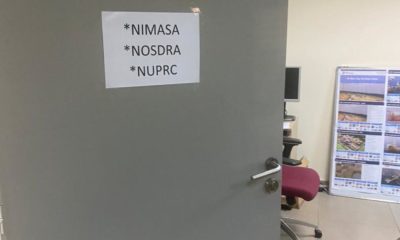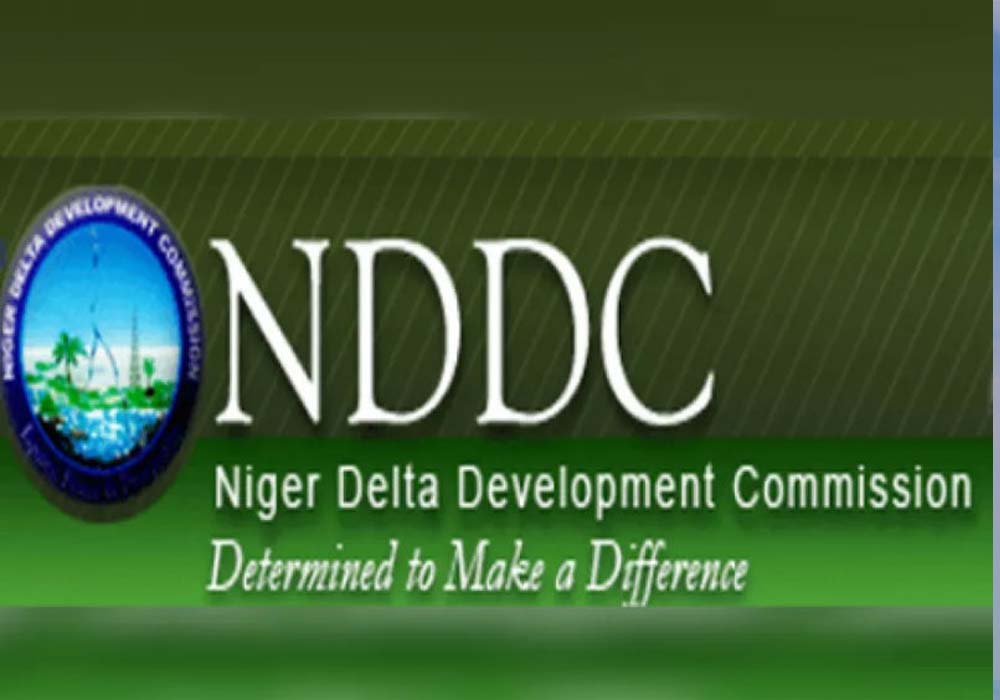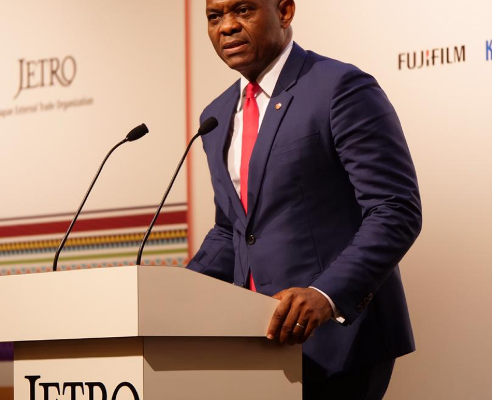Energy
NCDMB, Total Celebrates Load Out of Ikike AMD 2 Module, project to create 30,000 jobs

Modupe ASUDO
ABUJA-SENIOR officials of the Nigerian Content Development and Monitoring Board (NCDMB), Total Energies Nigeria and the Department of Petroleum Resources on Saturday in Port Harcourt, Rivers State celebrated the load out of the AMD 2 Module of the Ikike Development Project, describing it as another remarkable Nigerian Content accomplishment by Total Energies Nigeria Ltd.
The AMD 2 Module is a component of the Brownfield package of the Ikike project, and the contractor is Sudelettra Nigeria Ltd. The project is being developed as a satellite tie-back to the Amenam-Kpono field, also owned and operated by the Total/NNPC JV.
Delivering his address at the load out ceremony held at Sudelettra Fabrication Yard, the Executive Secretary of NCDMB, Engr. Simbi Kesiye Wabote lauded Total Energies for being a worthy partner in Local Content development since the enactment of the Nigerian Oil and Gas Industry Content Development (NOGICD) Act in 2010. He hinted that Total’s local content milestones on the Egina FPSO project remains a reference point for major project promoters to date.
The Executive Secretary who was represented by the General Manager, Projects Certification and Authorization Division, NCDMB, Engr. Paul Zuhumben noted that the Board and Total collaborated at the beginning of the Ikike project to earmark high local content commitments and targets which had now yielded fruits.
He listed some of the pace-setting statistics of the AMD-2 Module to include all engineering design works domiciled in Nigeria with 93 percent or 89,003 man-hours by Nigerian personnel and entire fabrication scope executed at Sudelettra Fabrication Yard, with Nigerians performing 98 percent of the 298,158 fabrication man-hours.
Other third-party services executed by Nigerian companies with requisite facilities included NDT, GRP Piping, Laboratory Testing, among others.
Wabote assured that other work scopes on the Ikike platform would be domiciled in accordance with the agreed local content targets, to sustain the job creation drive of the Federal Government.
He said: “in line with the commitment of Total Energies in the signed Nigerian Content Compliance Certificate (NCCC), hook-up engineering and tie-in services, inspections and integrity works, pre-commissioning and commissioning, marine activities would be executed with over 95 percent Nigerian personnel with locally owned equipment and assets.
“This is in keeping with the Board’s initiatives geared towards utilization of Nigerian owned marine assets and investments.”
The Executive Secretary further noted that the AMD-2 Module provided an opportunity to carry out refresher oil and gas trainings for 57 personnel as well as trainings for 30 new personnel. He requested the contractor and Total to retain the trainees in the remaining part of the Ikike project.
In his comments, the Executive Director, Total Energies, Port Harcourt District, Mr. Obi Imemba indicated that the entire Ikike project has recorded 77 percent overall progress and the construction of the modules-topsides, platforms, risers, jackets and all other packages were executed in various Nigerian yards by different vendors as approved by NCDMB. He added that “Our offshore campaigns are also being executed with vessels that are domiciled in Nigeria and the drilling is with Nigerian companies.”
He confirmed that the company had used the project to enable more than 30,000 jobs directly and indirectly, highlighting that all the aspects of the job were done with the spirit of promoting Nigerian Content and in collaboration with industry stakeholders.
The Executive Director also underscored the company’s commitment to developing a pipeline of oil and gas projects and supporting additional production potentials of Nigeria, adding that the company was keen to capitalize on all the lessons learnt from previous projects to develop the Ikike project in a simple, cost effective and efficient manner.
He recalled that the Final investment Decision (FID) for the Ikike project was taken in 2019, with support of the partners and the AMD-2 Module started in 2020 and on completion it weighed 250 tons.
He commended the contractor for delivering on the project despite the scourge of the COVID-19 and economic challenges and for recording more than 500,000 manhours without any Loss Time Injury (LTI).
Imemba assured that the offshore components of the project were already in progress, including the installation of topsides, adding that that commissioning and celebration of first oil were expected early 2022.
The Project Manager of Ikike Project, Total Energies, Mr. Modestus Nwosu confirmed that over 44 Nigerian vendors were engaged on various scopes of the Ikike project. He added that the project had also followed the instruction of the Board to undertake the renovation of a hostel and workshops in Government Technical College in Port Harcourt, River State.
Energy
NLNG Improves Nigeria’s Domestic LPG Supply Operational Efficiency

In line with its continuous improvement culture, the Nigeria LNG Limited (NLNG) will be working closely with its stakeholders to improve operational efficiency in its domestic Liquefied Petroleum Gas (DLPG) supply in Nigeria.
According to a statement from its General Manager, External Relations and Sustainable Development, Sophia Horsfall, this was highlighted at an engagement session with stakeholders in Lagos.
It was gathered that the NLNG plans to enhance engagement and improve operational efficiency of its LPG supply through digitalisation of some of its processes which include a new platform designed to streamline regulatory processes, optimise risk management, and enhance the buyer experience. The platform will feature IT-supported relationship management, automated issue resolution, centralised real-time payments, and improved case management systems, ensuring a seamless supply process despite market shifts and external pressures.
ALSO READ: Ifon-Ilobu Crisis: Adeleke Assures Of Quick Restoration Of Peace
Manager, Commercial Contract Management, NLNG, Tolulope Longe, reiterated that the planned improvements will enable and consolidate NLNG’s resolve to delivering 100% of its LPG supply to the Nigerian market.
She said a strategic roadmap was in play to ensure the achievement of NLNG’s longstanding goals of LPG being accessible and available in the country, aligning with its vision of being a globally competitive energy company, improving lives sustainably. She also harped on the significance of these improvement initiatives and the Company’s push for LPG utilisation as a clean energy source alternative to kerosene and other fossil fuels
Longe noted that the Company remained focused on growth and sustainability of the LPG market by continuously enhancing its supply processes in collaboration with offtakers. She stressed NLNG’s commitment to collaborating with stakeholders to maintain pricing stability and long-term market viability. While acknowledging industry concerns, she noted the importance of operational efficiency in meeting market demands.
NLNG aims to strengthen stakeholder engagement and improve market efficiency in the LPG sector through enhanced customer interactions, minimised schedule disruptions, timely confirmations and deliveries, and prioritisation of customers with demonstrable capacity. As it adapts to market realities, NLNG remains committed to driving sustainability and delivering lasting value to Nigerians.
Energy
Savannah Energy Completes SIPEC Acquisition

In line with its announcement of 19 March 2024, Savannah Energy has completed the acquisition of Sinopec International Petroleum Exploration and Production Company Nigeria Limited (SIPEC).
Making the revelation, an elated Chief Executive Officer, Savannah Energy, Andrew Knott, said, “We are delighted to announce the completion of the SIPEC Acquisition – the achievement of one of our core business priorities for 2025. Our focus at the Stubb Creek Field will now turn to progressing the expansion project, which we expect to increase production by almost three quarters over the course of 2025/26. I look forward to updating shareholders on this in the coming months, as well as on the progress we make towards achieving the other core business priorities we outlined to shareholders earlier this month.”
He expressed gratitude to the Nigerian government for making the acquisition possible, having required several levels of regulatory approvals.
ALSO READ: Tinubu Plans 10,000 Electric Vehicles For North-East
“I would like to thank the Government of Nigeria for the support that they have shown our Company in approving the SIPEC Acquisition and I extend a warm welcome to the SIPEC employees joining Savannah today,” he added.
Biztellers reports that the SIPEC’s principal asset is the 49% non-operated interest in the Stubb Creek oil & gas field (“Stubb Creek Field”), which is operated and 51% owned by Universal Energy Resources Limited (a Savannah affiliate company).
The SIPEC Acquisition increases Savannah’s Reserves and Resources base by approximately 30% from 151 MMboe to 197 MMboe. It adds 227 Bscf of 2C gross gas Resources at Stubb Creek Field, securing significant additional long-term feedstock gas available for sale to Accugas customers.
It was gathered that the transaction consideration was fully funded through a drawdown under a US$60 million Reserve-Based Lending debt facility arranged by The Standard Bank of South Africa Limited. At completion the cumulative consideration paid was approximately US$35.1 million (inclusive of approximately US$19.5 million of cash available to SIPEC), with US$2 million in deferred cash consideration payable in eight quarterly installments post-completion.
Savannah now intends to commence an up to 18-month expansion programme, which is anticipated to increase Stubb Creek Field gross production from an average of 2.7 Kbopd in 2024 to approximately 4.7 Kbopd.
Stubb Creek Field, located in Akwa Ibom State, Nigeria, is a producing oil field with considerable undeveloped, non-associated 2C gas resources. As at year-end 2024, Stubb Creek Field had an estimated 11 MMstb of 2P gross oil Reserves and 515 Bscf of 2C gross gas Resources1.
Commercial oil production started at Stubb Creek Field in 2015, with cumulative production of 8.1 MMstb to 31 December 2024. Oil produced at Stubb Creek Field is processed through production facilities onsite and then exported to the Qua Iboe terminal via a 25 km pipeline.
The Stubb Creek Field was converted to a 20-year petroleum mining lease in accordance with the Petroleum Industry Act 2021 and effective from 1 December 2023.
Energy
Shell On Place Of Infrastructure In Developing Nigeria’s Gas resources
Shell has called for the development of infrastructure to promote the growth of domestic gas and monetisation of the resource.
At a panel session at the just concluded Nigeria International Energy Summit (NIES) in Abuja, Managing Director Shell Nigeria Gas (SNG) Ralph Gbobo, said, “The infrastructure will support the delivery of gas from producers to consumers in an efficient way that is also transparent and cost effective.”
Ralph described infrastructure as the bedrock of a thriving gas industry, citing the Escravos – Lagos Pipeline System (ELPS) which feeds the domestic gas market as an example. He said: “If we can fully implement our regulations, a key one being the Network Code and maintain a stable Network where investors can get their returns, I can guarantee that we will see more players come into this space.”
ALSO READ: Shell Exhibition Delivers Value At Energy Summit
SNG which was established in 1988 has led the way in the provision of gas infrastructure in Nigeria, building gas distribution systems in Rivers, Abia and Ogun states through which it delivers gas to over 140 domestic, industrial and commercial customers. Last year, the company signed an agreement with the Oyo State Government to build a gas distribution infrastructure with the intention of delivering gas to businesses in the state and beyond.
Ralph explained: “Our experience at SNG shows that the task of expanding the Nigerian domestic gas market is a collective responsibility and not to be done by just a few players. It requires inputs from the regulatory, upstream, midstream and downstream sectors. The key to unlocking all these inputs is driving and implementing the right polices. The implementation of clear policies and incentives, allows for more investors to come into the domestic gas market be it in terms of gas production or infrastructural development. Investors need to be assured of a stable regulatory and fiscal market where their investments are guaranteed.”
He added: “Shell Companies in Nigeria have invested across the entire value chain of gas — Upstream, Midstream and Downstream having understood the potential of the commodity to accelerate industrial and economic growth in Nigeria.”






















